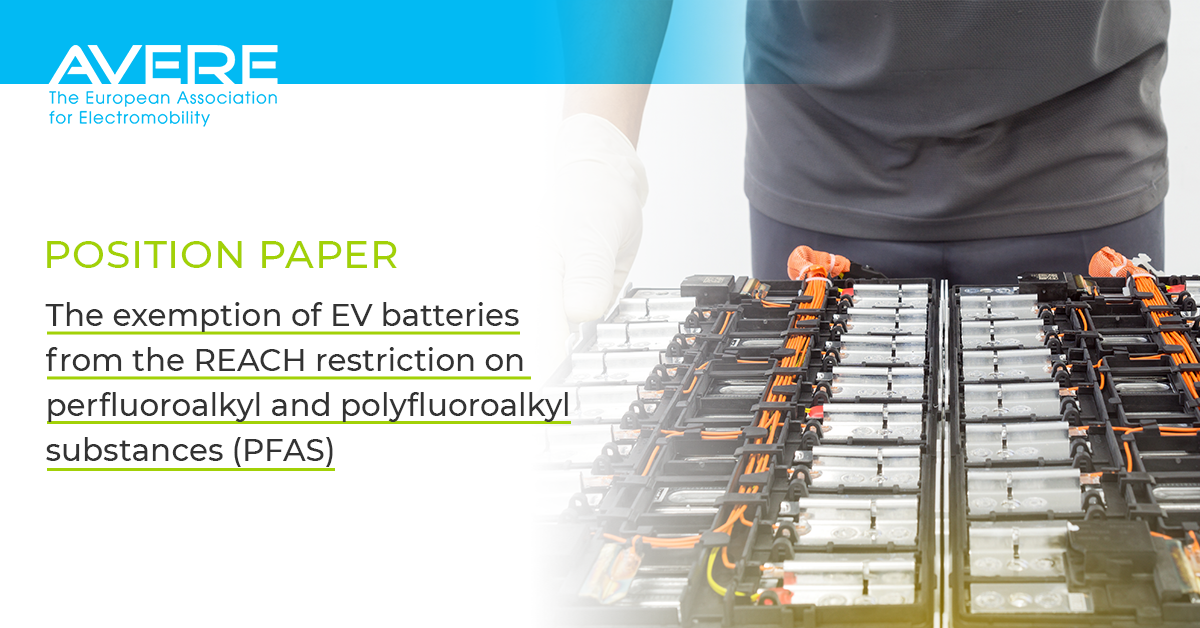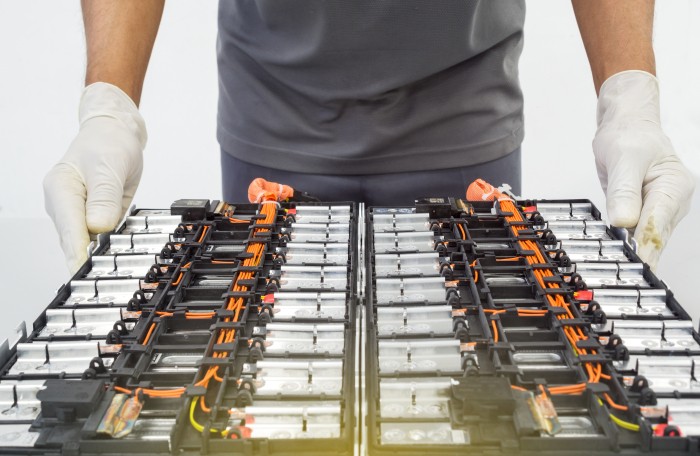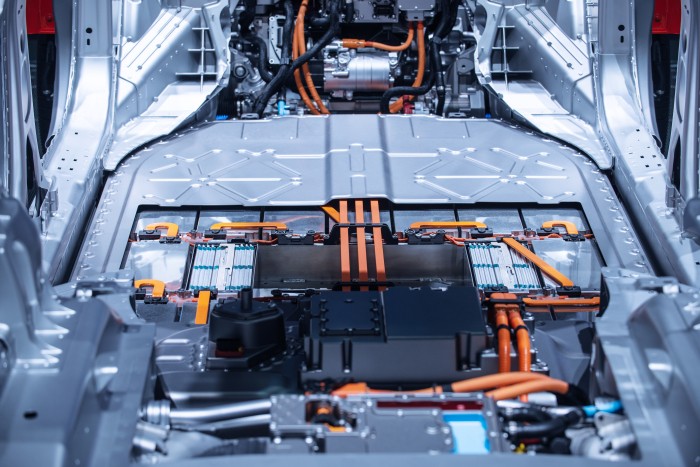
AVERE, the European Association for Electromobility, welcomes the European Chemicals Agency's environmental protection objectives, and acknowledges the intention and overall approach of the proposal to restrict PFASs under the revised version of REACH. However, AVERE fears that a blanket restriction on all uses of PFAS - including for the manufacture of EV batteries and for mobile air-conditioning systems (MACs) in vehicles - would have dramatic effects on the road transport sector's transition to zero-emissions.
POSITION PAPER
The Exemption of EV Batteries from the REACH Restriction on Perfluoroalkyl and Polyfluoroalkyl Substances (PFAS)

AVERE, the European Association for Electromobility, welcomes the European Chemicals Agency's environmental protection objectives, and acknowledges the intention and overall approach of the proposal to restrict PFASs under the revised version of REACH. However, AVERE fears that a blanket restriction on all uses of PFAS - including for the manufacture of EV batteries and for mobile air-conditioning systems (MACs) in vehicles - would have dramatic effects on the road transport sector's transition to zero-emissions.
The absence of derogation for the use of fluoropolymers in lithium-ion battery cell manufacturing processes would notably mean that the EU will no longer be able to produce batteries on the continent, which would directly endanger the transition to zero-emission mobility.
AVERE therefore calls on ECHA and the submitting authorities to:
- Include targeted derogations for the manufacturing of lithium-ion batteries
- Introduce explicit tracking of PFAS emissions from battery manufacturing and recycling as an alternative regulatory management tool
- To explicitly include EVs in the currently proposed time-limited derogation for PFAS used in vehicle mobile air conditioning (MAC).
1. Include an exemption from the PFAS restriction for the lithium-ion battery cell manufacturing process
Despite more than 30 years of research, as well as considerable investments from many of our fully electric OEMs, it is clear that no viable alternative to PFAS for the cell manufacturing process of lithium-ion batteries has emerged. While AVERE and its members support the efforts to reduce the environmental impact of our activities, we remain constrained to use PFAS to create electric vehicles’ main component: batteries. Indeed, batteries currently rely on PTFE (Polytetrafluoroethylene) and PVDF (Polyvinylidene fluoride) which are used as binder materials for the lithium-ion electrode manufacturing process.
The unlimited restriction on the use of PFASs proposed by ECHA would have disastrous effects on the battery industry, which would no longer be able to produce lithium-ion batteries on European soil, batteries sorely needed for road transport's transition to zero emissions and for the greater strategic autonomy and self-sufficiency objectives of the continent.
Additionally, the proposed restriction would duplicate sector-specific provisions on hazardous substances provided under the EU Batteries regulation’s Article 6 which ensures that potential and demonstrated risks to human health or the environment from hazardous substances used in batteries are appropriately managed. Article 47 also includes detailed end-of-life treatment and depollution requirements, which should guarantee that all PFAS components are destroyed during the recycling process.
AVERE therefore calls on ECHA to introduce an unlimited derogation for all PFAS substances used in battery production to ensure the EU fully switches to EVs on time to reach its climate targets.
2. Introduce explicit tracking of PFAS emissions from battery manufacturing and recycling as an alternative regulatory management tool

Although further investment and monitoring are required to ensure adequate PFAS reduction in battery recycling streams, the battery life cycle forms the basis of management. Unlike distributed sources of PFAS (kitchen utensils, lubricants, clothing, etc.), the entire battery life cycle is intentionally managed. Cells have well-defined characteristics and composition, enabling traceability of PFAS components through mass balance and other monitoring techniques. This also enables specific depollution technologies to be put in place, since cells used in automotive or energy storage applications are explicitly recycled in specific facilities where destruction performance can be optimized more effectively than that seen in municipal waste management facilities.
There are currently several methods to fully manage PFTE and PFAS at end-of-life (Thermal destruction by incineration or pyrolysis is the most common method). New technologies including catalytic dehydrohalogenation, Fenton oxidation, lye treatment and supercritical water oxidation are also emerging and may prove preferable or complementary over time to properly manage the end of life of PFAS and PFTE in batteries. Given the well-defined nature of cell recycling streams, it is also possible to optimize recycling streams to sequester and eventually reprocess these polymeric materials.
The aforementioned components only comprise a small percentage of the total cell material mass (0.5 - 1.5 wt. %) and currently the future of these materials is not explicitly tracked or monitored.
AVERE therefore believes that better and explicit tracking requirements of these components could help improve the appropriate capture and destruction of PFAS using complementary abatement technologies and improve depollution standards. A tracking tool would serve as a better alternative to the proposed blanket restriction.
3. Explicitly include EVs in the currently proposed time-limited derogation for PFAS used in vehicle mobile air conditioning (MAC)
The current proposed restrictions only establish a time-limited derogation for the use of PFAS substances in MACs of combustion engine vehicles with mechanical compressors and not for electric vehicles and a separate derogation for maintenance and refilling of vehicle MACs.
Regarding the proposed derogation for new cars, the derogation should not differentiate between EVs and internal combustion engines as EVs will rapidly make the bulk of the new vehicles sold on the market. Therefore, the proposed derogation for vehicles with mechanical compressors should be expanded to all vehicles.
Additionally, AVERE calls for a complete and unlimited derogation to be provided for the maintenance and refilling for MAC of any vehicle placed on the market before the entry into force of the restriction proposal.
